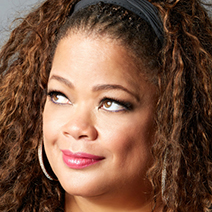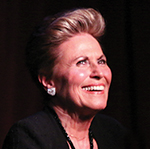Natalie Douglas
Tributes: Elvis
Birdland, NYC, April 9, 2018
Reviewed by Elizabeth Ahlfors for Cabaret Scenes

Photo: Bill Westmoreland
“I don’t sound like nobody,” said the boy from Tupelo. Elvis Presley was right. Nobody sounded, moved, performed, or looked like him, although many tried.
Natalie Douglas, who is in a class of her own, acknowledged Elvis’ undeniable influence on American popular music in the 20th century. In her latest Tribute show at Birdland, Douglas demonstrated the Elvis gift of melting various musical genres into his own sound. One of the first white singers performing rock and roll, he delivered a fusion of rhythm and blues, country, bluegrass, pop, and gospel.
Up to the early 1950s, rhythm and blues was an African-American songbook. At this time, Alan Freed, a white radio personality, was playing R&B—what he called “rock and roll”—on his Cleveland radio station. But it was Elvis who made the style world famous, popularizing rock and roll as the dominant international influence of pop music for decades. To his husky vocals, Elvis added a volatile stage presence with overt sexuality, pelvic thrusts and hip swivels, and became the highest-selling performer in history.
Douglas, a cabaret superstar herself, is charismatic with gregarious patter that appears spontaneous although, beneath the bubbly personality, is serious research and interpretation. She reveals a largely positive picture of Elvis, his shyness and piety, his women, the “Memphis Mafia,” and his manager, Colonel Tom Parker. But it is her renditions of Elvis’ powerful songs that speak for him in this show.
With Mark Hartman leading an electrifying quintet behind her, Douglas lit into “Blue Suede Shoes.” written and recorded by Carl Perkins in early 1956 and recorded by Elvis shortly after. Both renditions zoomed to the top, but Elvis remained there, establishing his place among the best early rock and roll recordings. The same year, he made his first of 31 films. In her intriguingly smoky tone, Douglas delivered “Love Me Tender” (George R. Poulton’s music with new lyrics by Ken Darby and Presley).
With a tempestuous vocal range and interpretive sensibility, Douglas drove the timing and rhythm of “Viva Las Vegas” (by Doc Pomus/Mort Shuman), as well as the well-loved romanticism of “Can’t Help Falling in Love” (Hugo Peretti/Luigi Creatore/George David Weiss). She selected renditions from his eclectic songbook, including a sing-along, “C’mon Everybody” (“…I lov-a my baby”) by Joy Byers from Viva Las Vegas; his original inspirational song, “Walk a Mile in My Shoes”; and a gospel favorite, “Peace in the Valley.” This hymn was originally written by Thomas A. Dorsey for Mahalia Jackson. Performing Elvis’ dramatic “Suspicious Minds” (Mark James), Douglas included its signature fade-out just toward the ending, before the song turned and a crescendo lent a final full-volume signature touch of excitement.
With throaty intensity, Douglas chose a beloved 1926 standard written by Roy Turk and Lou Handman, “Are You Lonesome To-night?” She delivered the sentimental verse and then replicated the spoken bridge that the writers based on Leoncavallo’s Pagliacci and Shakespeare’s As You Like It. Call it corny, but Douglas delivered the song with the total sincerity and investment that she gives all her music, and it never fails to bring on some tears.
At Birdland, Elvis lives on through Natalie Douglas and her sensational band led by Hartman on piano, Alec Berlin on guitar, Tom Hubbard on bass, Brian Nash on keyboard, and Shirazette Tinnin on drums.
Tributes coming up: Ella Fitzgerald on May 14; Shirley Bassey on June 18; Cher on July 16.





